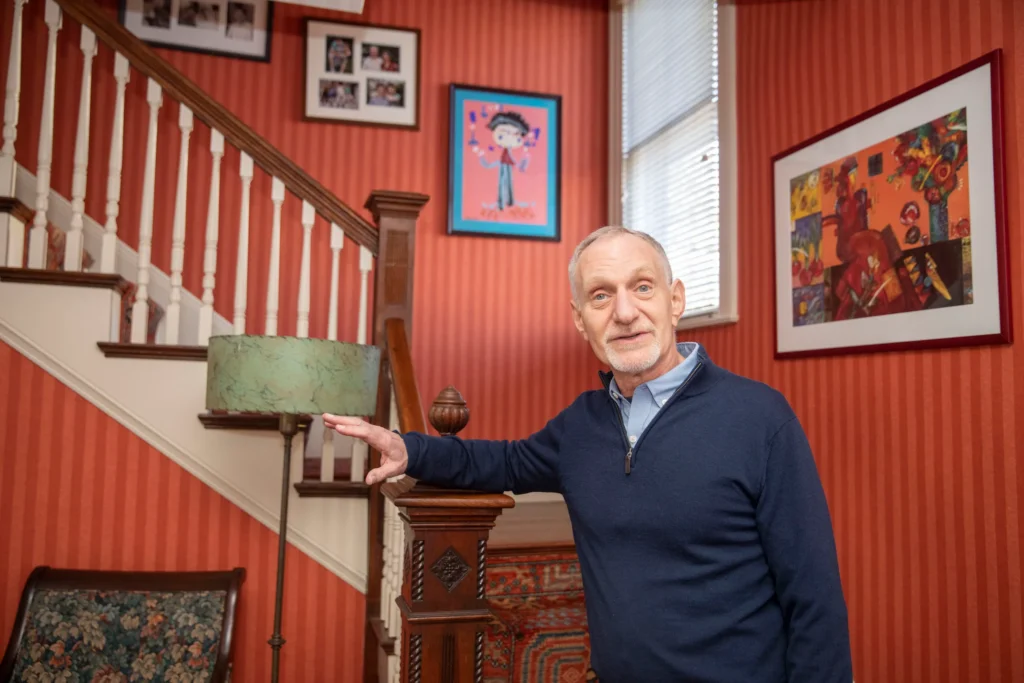What really makes for a good life? A lot of people think it’s success, things like money, fame, or big achievements. In fact, a survey once showed that was the top goal for many millennials. But do those things actually make us happy in the long run?
For almost 100 years, one amazing study has been trying to answer that question.
It’s called the Harvard Study of Adult Development, and it’s the longest-running study on happiness in the world. It started way back in 1938 and is still going today. At first, it followed 724 people. Now, it’s tracking over 1,300 of their children. So what did it find?
The biggest takeaway, after 85 years of research, is surprisingly simple: The key to a happy life isn’t money or fame. It’s strong, healthy relationships.
Dr. Robert Waldinger, the study’s current director, puts it like this:
“The clearest message is this: Good relationships keep us happier and healthier. Period.”

And it’s not just about feeling good. People with close relationships tend to live longer, too. So taking care of your friendships, family, and connections? That’s real self-care.
Society often tells us that a good life is about high salaries, job titles, or having it all on social media. But the Harvard study followed two very different groups: Harvard students and boys from Boston’s poorest neighborhoods. No matter where they started, the result was the same:
The people who were happiest and lived the longest had warm, meaningful relationships.
And the best part is that this is something anyone can work on. You don’t need to be rich or famous to build strong connections.
Contents
The Science of Connection: How Good Relationships Heal Us

So how can relationships actually affect our health?
It all comes down to stress. Life throws all kinds of challenges at us, and when that happens, our bodies go into “fight or flight” mode. That means stress hormones like cortisol flood our system. If that stress sticks around too long, it causes inflammation and slowly wears us down, physically and mentally.
But here’s the good news: Supportive relationships help calm our stress.
Dr. Robert Waldinger, who leads the Harvard happiness study, explains it like this: Let’s say something really upsets you. Your heart’s racing, you feel anxious. But then you go talk to someone who truly listens, and suddenly, you feel calmer. That’s not just emotional. Your body is actually responding and starting to heal.
There’s real science behind it, too.

When we connect with people we trust, our brains release a hormone called oxytocin, sometimes called the “bonding hormone.” It helps us feel safe, close, and supported. Oxytocin also lowers stress levels. So in a way, connection is nature’s built-in stress relief.
On the flip side, loneliness can be just as harmful as smoking or heavy drinking. It keeps our bodies stuck in a low-level stress state, which takes a serious toll over time.
But that’s not all. Strong relationships also protect your brain.
Research shows that people with close social ties have better memory as they age. That’s because connection builds something called “cognitive reserve”. It helps your brain stay strong and adapt, even as you get older. It even boosts activity in the hippocampus, the part of the brain that handles memory.
But here’s something important: It’s not about having tons of friends. It’s about having a few people you can truly rely on.
A high-conflict relationship (like a really tense marriage) can actually harm your health more than being alone. That kind of constant stress keeps your body on edge. But when you’re with someone you trust and feel safe with, your body can finally relax, reset, and recharge.
In short: Good relationships are good for your health, your brain, and your whole life.
Also See: Harvard Negotiator Explains How to Argue and the Secrets to Winning Any Argument or Debate
The Secret to Happiness: Building Your Social Fitness

One of the most helpful ideas to come out of the Harvard happiness study is something called social fitness.
Think of it like physical fitness, but for your relationships.
Just like your muscles weaken if you stop exercising, your connections with people can fade if you don’t keep them up. Friendships, family ties, even close partnerships; they all need regular care to stay strong.
And that’s what social fitness is all about: actively maintaining the relationships that matter most.
This idea is more important than ever. Right now, we’re living through what many experts are calling a loneliness epidemic. Studies show that people all over the world are feeling more isolated, and surprisingly, it’s young adults who report feeling the loneliest.
That’s why taking care of your social life is essential for your health and happiness.
But here’s the thing: Social fitness isn’t a one-time fix.
Those small, consistent actions: checking in, reaching out, showing up. A text. A phone call. A coffee. These simple moments, done regularly, help keep your relationships alive and thriving.
The Harvard study has been going on for over 85 years now. And after all that time, the message is clear:
Happiness is built through connection. And connection is built through effort.
Read: Just Eat These Every Day Like Japan’s Oldest Doctors – Science Says You Could Live to 100
Your Personal Social Fitness Assessment

How’s your social life, really?
Sometimes it helps to take a moment and reflect. The researchers behind the Harvard happiness study created a simple exercise that works kind of like an X-ray for your relationships. It shows you where you’re getting support, and where you might want to strengthen things.
They identified seven types of support that make relationships truly nourishing. Here’s a quick guide:
- Safety & Security
Who could you call in the middle of the night if you were sick, scared, or in trouble?
- Learning & Growth
Who inspires you to try new things or reach for your goals?
- Emotional Closeness & Confiding
Who can you open up to when you’re feeling down? Who really gets you?
- Identity Affirmation & Shared Experience
Who’s known you for a long time? Who reminds you of who you are?
- Romantic Intimacy
Are you happy with the amount of romantic or intimate connection in your life?
- Help (Practical Support)
Who do you turn to when you need advice, help moving, or someone to pick you up from the airport?
- Fun & Relaxation
Who makes you laugh? Who do you call when you just want to have a good time?
Take a look at the table below. Think of the most important people in your life. For each person, consider which of the seven needs they help you meet. Remember, it is okay if no single person provides all seven types of support. This exercise is just to give you a clearer picture of your own social universe.
My Relationship With:
Safety & Security
Learning & Growth
Emotional Closeness
Identity Affirmation
Romantic Intimacy
Help
Fun & Relaxation
Person 1
Person 2
Person 3
Person 4
Person 5
How to Build a Richer Social Life, Starting Now

Once you’ve taken stock of your relationships, it’s time to take action.
The best part? It’s never too late to start.
Take Andrew Dearing, one of the participants in the Harvard study, for example. He was in his 60s, recently retired, and going through a divorce. He felt lonelier than ever. But at age 67, he joined a local gym. Over time, he got to know people there. By his 80s, he had social contact every single day.
His story is a great reminder: we can always work on our social fitness.
Check out: These 13 Books So Eye-Opening You’ll Ask, ‘Why Isn’t This Taught in School?
Strengthen the Relationships You Already Have

Start with the people who are already in your life. Even the smallest efforts can go a long way.
🔹 The 15-Second Action
Think of someone you haven’t talked to in a while: a friend, a cousin, anyone you miss.
Now, send them a quick message:
“Hey, I was just thinking of you and wanted to say hi.”
That’s it. It might seem small, but it can reopen a connection and even make someone’s day.
🔹 Practice Radical Curiosity
Next time you’re catching up with someone, be genuinely curious.
Ask them a thoughtful question, something deeper than “how’s work?”, and really listen to the answer. It shows you care, and it makes the other person feel seen.
🔹 Give Your Full Attention
When you’re with someone, be with them.
Put your phone away. Not just face down, but out of sight. Research shows that even a silent phone on the table makes conversations less meaningful.
Make New Connections, At Any Age

Making new friends as an adult can feel awkward, but it’s absolutely doable. The Harvard study offers a surprisingly simple strategy:
🔹 Follow the Shared Interest Rule
Do something you enjoy, and do it with other people.
Whether it’s yoga, book club, pottery, or joining a local run group, shared activities naturally lead to connection.
🔹 Join a Group or Club
Pick something you’re into. It could be a gardening club, a bowling league, a community choir, or even a language class.
The key? Everyone’s already showing up with something in common.
🔹 Be of Service
Volunteering is one of the most powerful ways to connect.
Helping others gives you a sense of purpose, while also opening the door to meeting kind, like-minded people. And it often leads to deep, meaningful bonds.
You May Like: These 6 Foods Will Burn Fat and Heal Your Body, Says a Fasting and Nutrition Expert
The Good Life Is a Journey, Not a Destination
For over 85 years, Harvard researchers have studied what helps people truly thrive. And what they found isn’t some big finish line or final destination.
It’s something you build. Day by day, moment by moment.
The biggest takeaway from the study: strong, healthy relationships are the #1 key to a happy life.
But it’s not only about feeling good emotionally. Nurturing your connections can actually improve your physical health and help you live longer. It’s one of the most powerful things you can do for your overall well-being.
The good life doesn’t happen all at once. It’s created in small, everyday choices:
- A quick check-in text.
- A real conversation without distractions.
- A shared laugh or a helping hand.
And the best part is that it’s never too late to start. Whether you’re 25 or 85, you can begin building a richer, more connected life, one relationship at a time.
Why not start now? Send that 15-second message to someone you care about. That tiny step could be the beginning of something deeply meaningful. Because the secret to happiness, after 85 years of research, isn’t far away. It’s right here, within your reach.